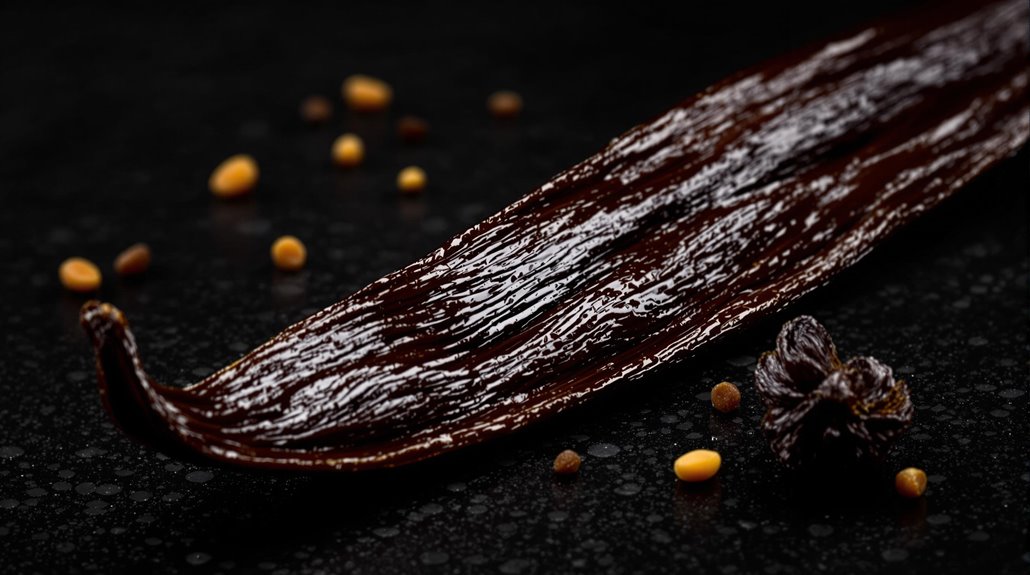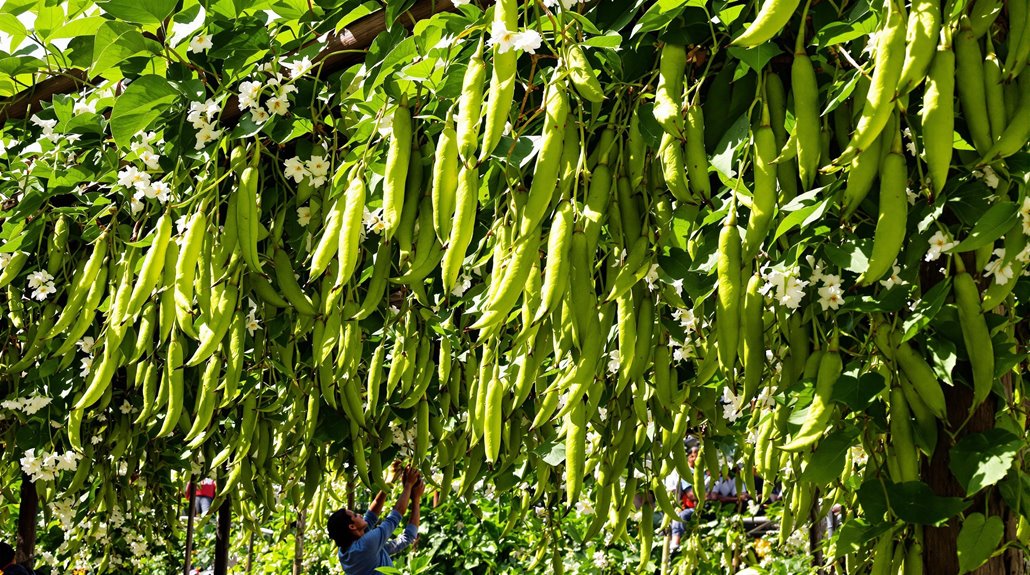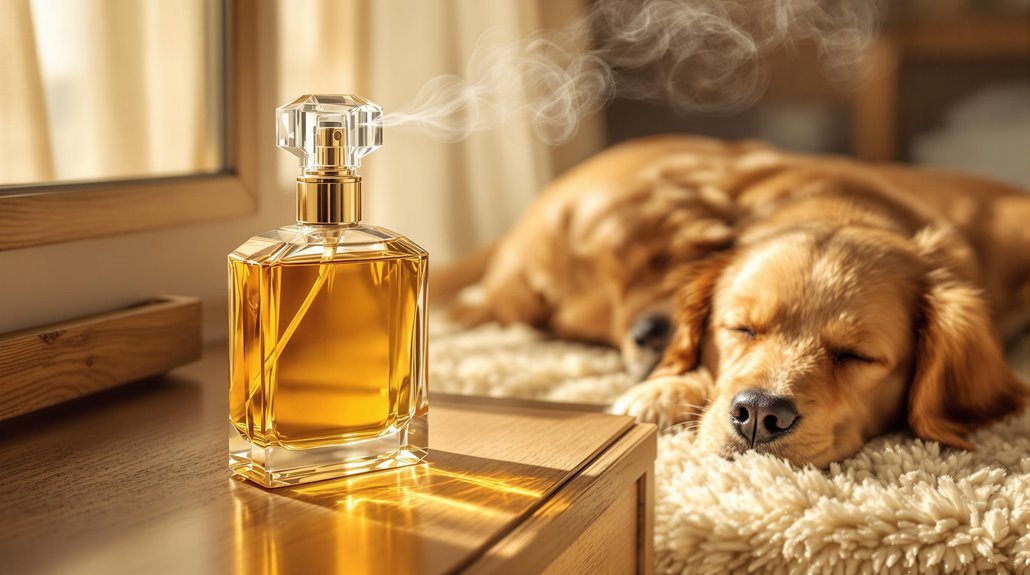Can Vanilla Repel Bugs? Exploring Its Practical Uses
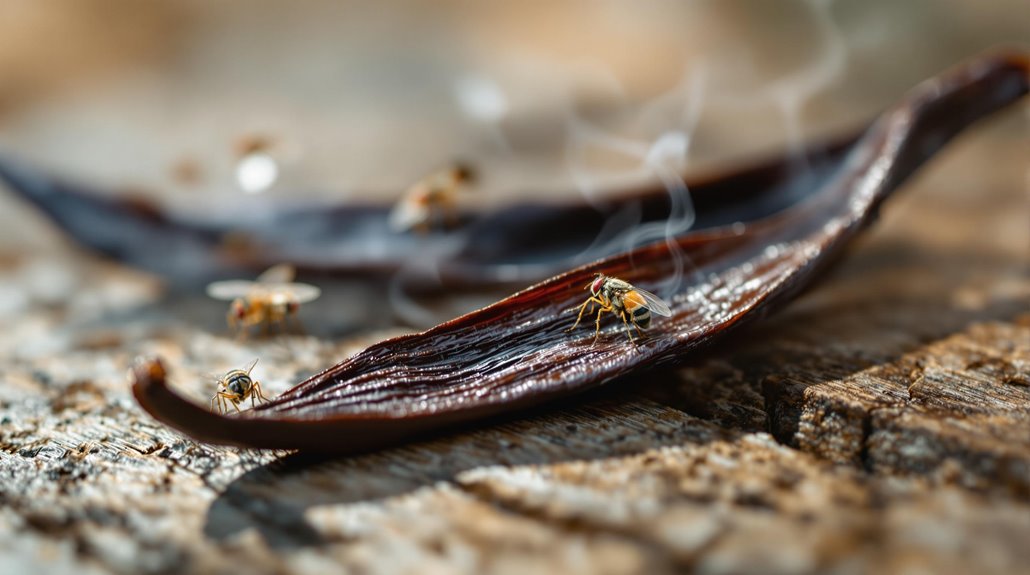
While vanilla extract can mask your scent from mosquitoes and other insects, you shouldn't rely on it as your main bug repellent. The vanillin in vanilla extract only provides limited protection for 30-45 minutes at most, and its effectiveness varies considerably between different bug species. You'll find it works better as a cooking ingredient than a reliable insect deterrent.
For proper protection, especially in areas with mosquito-borne diseases, you'll want to use EPA-registered insect repellents instead. Understanding the real capabilities and limitations of vanilla extract can help you make smarter choices for bug protection.
Understanding Vanilla's Natural Repellent Properties
Naturally occurring compounds in vanilla extract offer a gentle approach to mosquito control, with vanillin serving as its primary repellent component. When you apply vanilla extract to your skin, it works by masking your natural scent, making it harder for mosquitoes to detect and target you.
While vanilla extract can serve as a natural repellent, you'll need to understand its limitations for effective use. The protection typically lasts between 30 to 45 minutes, so you'll need to reapply frequently to maintain its effectiveness. You can enhance the repelling properties by combining vanilla extract with other essential oils, creating a more potent natural defense against mosquitoes.
If you're considering vanilla extract as your primary mosquito deterrent, remember that it's not as powerful as EPA-registered repellents. While it's an affordable and accessible option for making homemade mosquito repellent, you shouldn't rely on it exclusively in areas where mosquito-borne diseases are prevalent. Instead, consider using it as a supplementary method or in situations where mosquito exposure is minimal and brief.
Making Your Own Vanilla Spray
Creating a simple vanilla-based mosquito spray requires just two basic ingredients: pure vanilla extract and water. You'll need to combine equal parts of each - one tablespoon of vanilla extract and one tablespoon of water - in a clean spray bottle. Guarantee both ingredients blend well together.
This natural alternative to commercial repellents is both cost-effective and easy to prepare at home. When you're ready to use your homemade mosquito repellent, simply spray it directly onto your exposed skin before heading outdoors. Keep in mind that you'll need to reapply the solution more frequently than synthetic repellents, as its effectiveness typically lasts only 30-45 minutes.
While the vanilla extract mixture can help mask your natural scent that attracts mosquitoes, it's important to understand its limitations. This DIY solution isn't as powerful as EPA-registered repellents, but it can serve as a gentle, natural option for brief outdoor activities. For maximum protection, spray the solution evenly on exposed skin, and always carry the bottle with you for regular reapplication when needed.
Scientific Evidence Behind Vanilla Protection
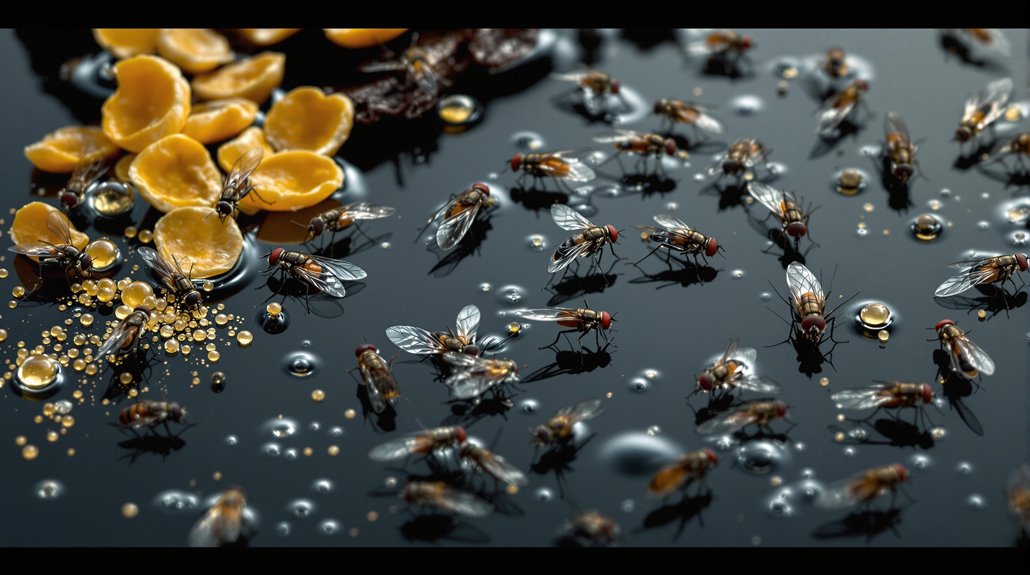
Through extensive research, scientists have confirmed that vanillin - the primary compound in vanilla extract - does possess mild insect-repelling properties. When you use vanilla extract as a natural insect repellent, you'll experience protection for about 30-45 minutes, particularly against common mosquito species like Aedes aegypti and Anopheles gambiae.
While scientists haven't fully decoded how vanilla works as a mosquito repellent, they believe it interferes with insects' ability to detect attractive scents, making you less appealing as a target. You'll find that vanilla extract works best when combined with other natural repellents like citronella or lemongrass oils, which can enhance its protective effects.
However, you shouldn't rely solely on vanilla extract for complete protection against biting insects. Research shows it is considerably less effective than EPA-registered commercial repellents, both in strength and duration. If you're planning extended outdoor activities or visiting areas with high insect populations, you'll want to use traditional insect repellents as your primary defense. Consider vanilla extract as a supplementary natural option for short-term, low-risk situations.
Comparing Vanilla With Other Repellents
When comparing vanilla extract to other insect repellents, you'll find noteworthy differences in both effectiveness and duration of protection. While vanilla extract does offer some mosquito-repelling properties, it's considerably less effective than many natural and synthetic alternatives available on the market.
For longer-lasting protection, you'll want to examine EPA-registered natural options like oil of lemon eucalyptus and neem oil, which can protect you for up to 6 hours against biting insects. These alternatives immensely outperform vanilla extract's short-lived effectiveness. You can also try citronella oil, which provides about 2 hours of protection, or other essential oils like clove, peppermint, and lavender that have proven repelling capabilities.
If you're looking for a more permanent solution, you might want to invest in permethrin-treated clothing, though it works best when you're staying still. To maximize your protection against mosquitoes, you'll get better results by combining different approaches. Examine using a proven repellent like oil of lemon eucalyptus as your primary defense, while maintaining a clean environment and using complementary methods like personal diffusers or mosquito-repelling plants.
Safe Application Methods
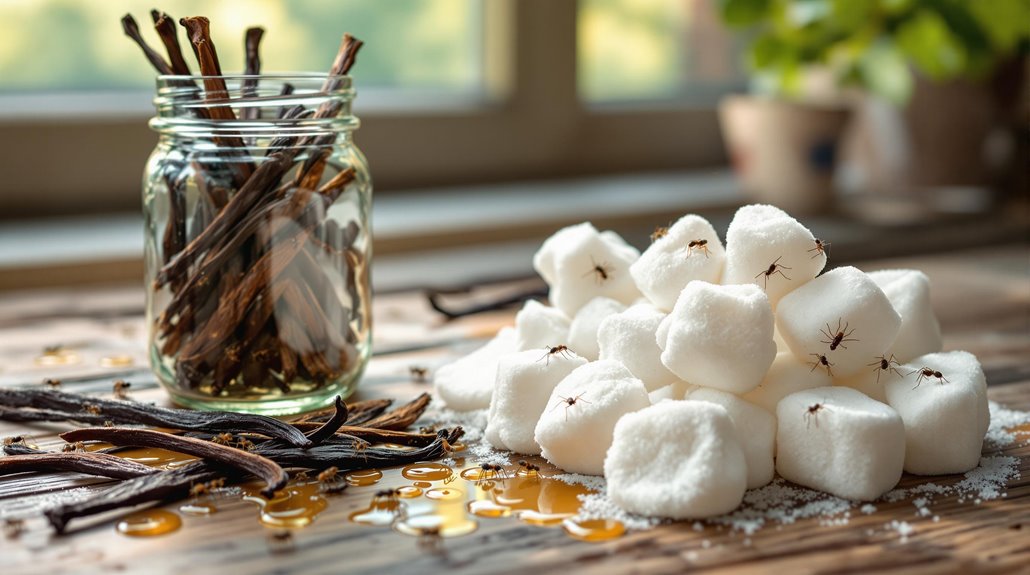
A gentle approach works best when applying vanilla extract as a natural repellent. Before using it directly on your skin, do a small patch test to check for any adverse reactions. You'll want to dilute pure vanilla extract with a carrier oil to minimize potential skin irritation while maintaining its bug-repelling properties.
For safe and effective application, follow these essential guidelines:
- Mix vanilla extract with coconut or olive oil in a 1:3 ratio for a gentler formula
- Apply the mixture to exposed skin areas using clean hands or a spray bottle
- Reapply every 30-45 minutes to maintain effectiveness
- Avoid contact with eyes, mouth, and sensitive skin areas
- Discontinue use immediately if you experience any irritation
While vanilla extract offers a natural alternative to chemical repellents, it's important to understand its limitations. For enhanced protection, consider combining it with other natural deterrents like citronella or lemongrass. However, if you're traveling to areas with high mosquito-borne disease risks, opt for EPA-registered repellents instead. The key is finding the right balance between natural solutions and proven effectiveness for your specific needs.
Effectiveness Against Different Insects
Vanilla's reputation as a natural insect repellent comes with mixed results across different bug species. When it comes to mosquitoes, you'll find that vanilla extract offers some protection, but it's important to understand its limitations. The effectiveness typically lasts between 30-45 minutes, making it a short-term solution that requires frequent reapplication.
You'll notice varying results depending on the mosquito species you're dealing with. While some mosquitoes are more sensitive to vanilla's repelling properties, others may be less affected. If you're comparing vanilla extract to EPA-registered repellents like DEET or picaridin, you'll find that vanilla falls short regarding protection duration and overall effectiveness.
When it comes to other common pests like ticks, fleas, or ants, you shouldn't rely solely on vanilla extract as a repellent. There's limited scientific evidence supporting its effectiveness against these insects. While vanilla can help mask your natural scent that attracts mosquitoes, you'll get better results using proven botanical or chemical-based repellents for broad protection against multiple insect species.
Common Vanilla Extract Myths Debunked
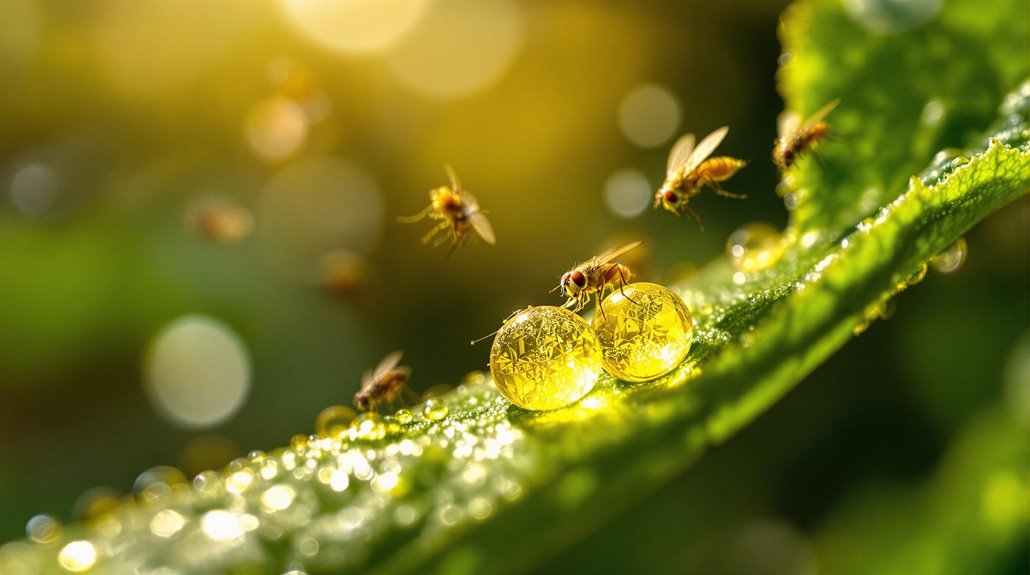
Understanding the reality behind vanilla extract's bug-repelling capabilities helps distinguish fact from fiction. While you might have heard claims about vanilla extract being a powerful mosquito deterrent, scientific evidence suggests otherwise. The effectiveness of vanilla extract as an insect deterrent is limited and temporary, typically lasting no more than 30-45 minutes.
You'll want to take into account these key facts about vanilla extract's actual capabilities:
- It's not a reliable standalone mosquito deterrent
- Its deterrent properties only last 30-45 minutes at most
- The effectiveness varies considerably between mosquito species
- Results can differ based on individual sensitivity
- It doesn't provide sufficient protection in disease-risk areas
While vanilla extract contains vanillin, which can mask human scents from mosquitoes, it doesn't offer the thorough protection you need. Don't rely on vanilla extract alone, especially if you're in areas where mosquito-borne diseases are prevalent. Instead, opt for EPA-registered insect repellents that have been extensively tested and confirmed effective. This approach guarantees you're getting reliable protection rather than depending on a short-term solution with unpredictable results.

